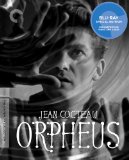| Reviews & Columns |
|
Reviews DVD TV on DVD Blu-ray 4K UHD International DVDs In Theaters Reviews by Studio Video Games Features Collector Series DVDs Easter Egg Database Interviews DVD Talk Radio Feature Articles Columns Anime Talk DVD Savant Horror DVDs The M.O.D. Squad Art House HD Talk Silent DVD
|
DVD Talk Forum |
|
|
| Resources |
|
DVD Price Search Customer Service #'s RCE Info Links |
|
Columns
|
|
|
Orpheus: The Criterion Collection
THE MOVIE:
"A legend is entitled to be beyond time and place."
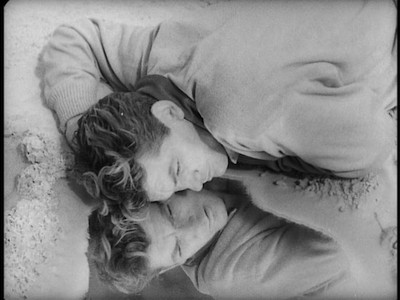
Please Note: The screen captures used here are from the standard-definition DVD released in 2000, not from the Blu-ray edition under review.
Like many folks my age, my first exposure to Jean Cocteau's 1950 art film Orpheus was seeing the famous image of Jean Marais laying in a puddle, sleeping over his own reflection, as the cover to the Smiths single "This Charming Man." With his up-do coif the right combination of styled and messy, Marais bears more than a passing resemblance to Morrissey; then again, it's really the Smiths singer who was co-opting the French actor's look. The image itself had oodles of mystery, a combination of narcissism, romance, and fatalistic morbidity that could inspire a lifetime of bad poetry. I even had a poster of it on the wall of my college dorm, some ten years before I would ever see Orpheus for real.
Watching the film again, the choice of the Marais photo still as a record sleeve makes more and more sense. Cocteau molds the mythical figure into a jazz-age outsider. He is a bard whose popular verse has made him an outcast amongst his bohemian peers, and his brooding manner endears him to teeny boppers nearly as much as his chiseled matinee-star good looks. It's the kind of jarring dichotomy between artistry and fame that Morrissey and his co-writer, Johnny Marr, would infuse their music with. For as much as they were a jangly indie guitar band, they were also a pop band. And for as much as Orpheus is a high-minded art film, Jean Cocteau has also made a pop art masterpiece, employing all the funhouse tricks at his disposal to create a raucous cinematic entertainment.
"Orpheus, your gravest fault is knowing just how far to go too far."
Cocteau's Orpheus has its origins in the famous myth of the troubadour who traveled to Hell to rescue his soulmate, only to fail to live up to the restrictions of his deal with Death upon returning to Earth, but the French director has updated and molded the material to fit the times. Set to a jazzy score by Georges Auric, it prefigures rock 'n' roll in surprising ways, with touches of the skiffle-beat musicals and juvenile delinquent movies that were to soon spring fully formed from Elvis Presley's gyrating hips. The movie opens in a bohemian café. Orpheus has stopped in for a drink, only to suffer the open scorn of his peers and rivals who resent his success. The poet is understandably defensive, since he also has his own anxieties about his flagging abilities. Accomplishment is a difficult mistress to keep maintained in the style to which she has become accustomed.
On this particular day, a Roll's Royce also delivers the latest enfant terrible of verse, a drunken teenager named Cégeste (Edouard Dermithe). He has just published his first chapbook under the title of "Nudism." It is a collection of blank pages, like John Cage's concertos of silence, and Cocteau's perverse joke on the avant-garde. The car belongs to Cégeste's patron, a dark-haired ice queen known only as the Princess (Maria Casarés, Children of Paradise). Its stoic driver is Heurtebise (François Périer, Nights of Cabiria). Before days end, the café will erupt in a rumble of poets, and Cégeste will be struck down by a pair of motorcycle riding messengers of death. Orpheus will end up in the Princess' car, entangling him in a supernatural plot he didn't bargain for.
As the Rolls Royce drives into unknown territory, Orpheus becomes increasingly aware of the strange situation he has stumbled into. Coded messages filter in over the radio, and the Princess refuses to answer any of his questions. The motorcycle riders are waiting for her at her home, and once there, Cégeste is also restored to life--or a semblance of such. The Princess, as it turns out, is Death herself, and Orpheus is her new fixation. She leaves him in his world, but commands Heurtebise to stay by his side. The driver takes Orpheus home, only to find that there is a scandal surrounding his disappearance. His wife, Eurydice (Marie Déa, Lelouch's Marriage), is hiding from reporters who want to know what happened to Cégeste. A police inspector (Pierre Bertin) is in their kitchen, as well as Aglaonice (Juliette Gréco, Elena and Her Men), a friend of Eurydice's who already hates Orpheus. She is a member of a group called the Bacchantes who will eventually come looking for the poet's head.
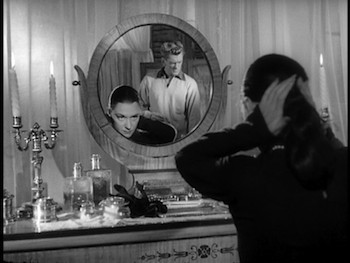
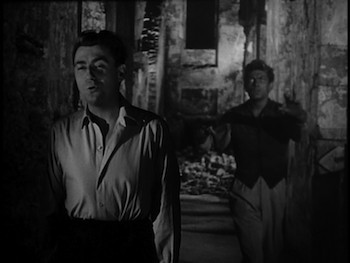
For as strange as this sounds, it only gets stranger still. Orpheus starts spending all of his time in the garage, listening to the radio in the Princess' Rolls, waiting for more poetic non-sequiturs from the beyond. He becomes so enraptured, in fact, he fails to see Heurtebise's growing affection for his wife or heed the warnings when Death comes to claim Eurydice. The Princess is as obsessed with Orpheus as her ghostly driver is with his spouse, transgressions that cross the untraversable lines between this life and the next. Once Orpheus finally wakes up to what is happening--the movie makes multiple references to dreams, asserting that this may all be the poet's nightmare--he compels Heurtebise to take him below ground to find Eurydice and bring her back.
This could all be some serious stuff in the wrong hands, but Jean Cocteau approaches his mythic material playfully. He sees the classic story as a metaphor for artistic passion. Orpheus is so taken with his melancholy muse, he ignores the real world, causing damage to his relationships and forcing some reconciliation between what goes on in his head and what is happening in the flesh. Marais plays the poet as a vain, self-serious brat, an eternal teenager who refuses to leave the comfort of his adolescent humors. His relationship with Casarés' raven-tressed Death is practically a gothic parody. The pouty poet is obsessed with his own mortality, and how could he not be flattered to discover that mortality is also obsessed with him! Juxtaposed with this, Marie Déa's blonde beauty plays to the fairy tale conventions of innocence. She is sweetness personified, an expectant mother, the ill-treated lover. Naturally, the dependable Heurtebise, who committed suicide for want of a woman, would be drawn to her; he works for the dark side, he's seen its flaws. It's marvelously realized melodrama, timeless and hormonal, broaching dire subjects but with a light, sardonic touch. This is a romance, after all, where one of the lovers easily flips between the woman he intends to save and the one who took her away--made all the more amusing by the fact that Marais was Cocteau's former lover and Dermithe was his current one at time of shooting. It's not exactly the most lovesick scenario, but it has its charms.
In fact, Cocteau's tiptoeing through the afterlife is actually a lot of fun. His vision of Hell is imaginative and unique, using the ruins and rubble that would have been commonplace in post-War France to craft an image of damnation that is both a sad remembrance of the tragedy that hit his country only years before and a reminder of the resiliency that pulled them through. While some of his special effects seem antiquated and rickety today, Cocteau's films work because the artist embraced the joyous possibilities of motion pictures with a childlike exuberance. The movie camera is his toy, and he wants to learn everything he can do with it. Running the shot backwards, rear projection, make-up, and literal smoke and mirrors are all weapons in his arsenal, and even though he was already an accomplished auteur by this point (he had made his wondrous version of Beauty and the Beast four years prior), he approaches each effect with a gleeful naïveté. Cocteau on a movie set is like a child in a magic shop, eager to sample each trick, always willing to believe that the illusion is real.
It's this wild abandon that keeps Orpheus feeling fresh after all these years. It's why new packs of youngsters and movie buffs keep rediscovering Cocteau's experimental flights of fancy and going along for the ride, maybe identifying themselves in the archetypes, maybe just digging Orpheus for its style and passion. It's the same reason a band like the Smiths or an author like J.D. Salinger has a legacy that far exceeds their output. Jean Cocteau was 60 when he made Orpheus, but he was still a teen rebel, a rock star before there was any such thing. Some dudes start out cool and they stay cool forever.
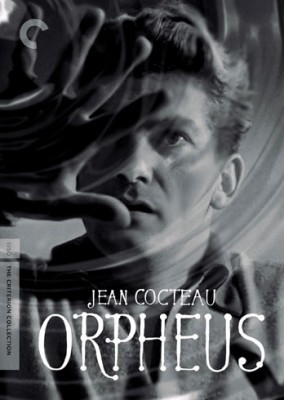
THE BLU-RAY
Video:
The 1080p transfer (MPEG-4 AVC) on the Orpheus Blu-Ray is miraculous. The full frame, 1.33:1 black-and-white image has been meticulously restored, removing all but minor print errors and achieving a gorgeous tonal balance in Cocteau and cinematographer Nicolas Hayer's imaginative photography. The image grain is excellent, with nice detail in all corners of the frame and impressive textures for a film that is older now than even the director was when he made it. There is a greater subtlety to the rendering than ever before, with impressive shadows and an overall gradient that captures the nuance of the lighting and the special effects without ever exposing the man behind the curtain.
Sound:
The mono soundtrack, presented without compression, sounds fantastic. The dialogue is clear as a bell, and there is no misplaced hiss or other issues of distortion.
The new subtitles read well, with good pacing and a flair for Cocteau's language.
Extras:
Criterion releases Orpheus with all-new artwork and a thick booklet featuring a new assessment of the movie by Mark Polizzotti, an added excerpt from author James S. Williams (who also provides commentary), and the same essay from Cocteau, written when Orpheus was being released, that Criterion included in their 2000 DVD. In fact, that was the only extra at the time, a void that has been more than filled on the new disc. The includes the aforementioned audio commentary, recorded for this release by Williams. It's a great track, full of lots of info about the movie and about the man who made it. If you spend time with one extra, this will do handily.
That said, there is also plenty more to explore for those with the time to do so, including a French documentary from 1984 titled Jean Cocteau: Autobiography of an Unknown. Presented in high-def (as are all the extras), the film, which was directed by Edgardo Cozarinsky, packs a lot of information into its 67 minutes. It serves as a great primer on Cocteau, and makes for excellent viewing all on its own.
More specific to the film, Criterion gives a trio of featurettes exploring two of the more notable aspects of Orpheus: the visual mastery and the musical score. The 15-minute "Jean Cocteau and His Tricks" is an interview with Claude Pinoteau, Cocteau's AD, and he shares some info on how they pulled off their onscreen illusions. Going along with this is a very short, silent newsreel from 1950, showing the ruins of the Saint-Cyr military academy, which was used in Orpheus as the setting for the journey into the underworld. Also of an older vintage is the 1956 "In Search of Jazz," with Cocteau talking about his choice for the music in the movie (also just over 15 minutes).
Another archival piece is the appropriately titled "40 Minutes with Jean Cocteau," a 1957 television interview in which the artist reflects on his movie career, his painting, and the things that drive him. It should be noted, too, that this was shot by Nicolas Hayer, who also was DP on Orpheus. It shows footage of Cocteau's home in Santo-Sospir, which is also the subject of the short film La villa Santo-Sospir, a 37-minute tour of his home that Cocteau put together in 1951.
Finally, we get a gallery of stills by photographer Roger Corbeau and the movie's theatrical trailer.
FINAL THOUGHTS:
Highly Recommended. The Criterion reissue of Jean Cocteau's masterful Orpheus is equally as masterful as the film it presents. Beautifully restored and packed with extras, the Blu-Ray is tremendous, showcasing the director's vivacious jazz-age take on classic mythology with the appropriate care and perfection. Orpheus is stylish and imaginative, an entertaining remodel of a classic story, following a brooding poet into Hell to rescue his love and confront his muse. It's as vital today as it ever was, as evidenced by its flawless transition into yet another home video format.
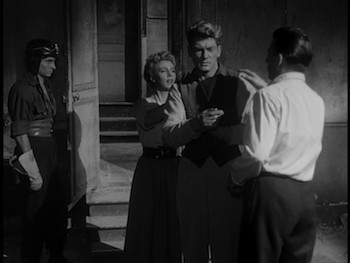
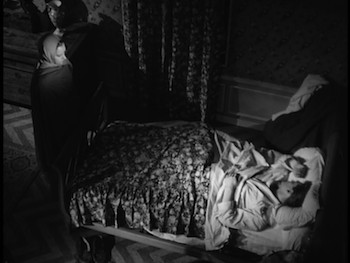
Jamie S. Rich is a novelist and comic book writer. He is best known for his collaborations with Joelle Jones, including the hardboiled crime comic book You Have Killed Me, the challenging romance 12 Reasons Why I Love Her, and the 2007 prose novel Have You Seen the Horizon Lately?, for which Jones did the cover. All three were published by Oni Press. His most recent projects include the futuristic romance A Boy and a Girl with Natalie Nourigat; Archer Coe and the Thousand Natural Shocks, a loopy crime tale drawn by Dan Christensen; and the horror miniseries Madame Frankenstein, a collaboration with Megan Levens. Follow Rich's blog at Confessions123.com.
|
| Popular Reviews |
| Sponsored Links |
|
|
| Sponsored Links |
|
|
| Release List | Reviews | Shop | Newsletter | Forum | DVD Giveaways | Blu-Ray | Advertise |
|
Copyright 2024 DVDTalk.com All Rights Reserved. Legal Info, Privacy Policy, Terms of Use,
Manage Preferences,
Your Privacy Choices | |||||||









